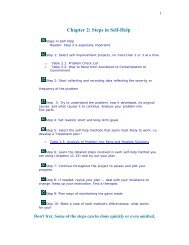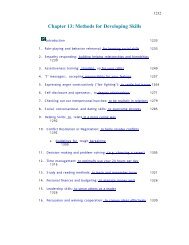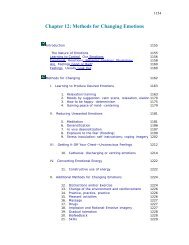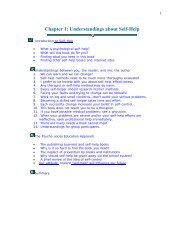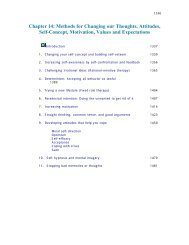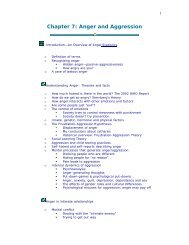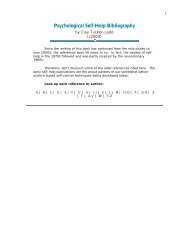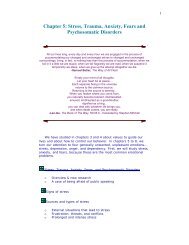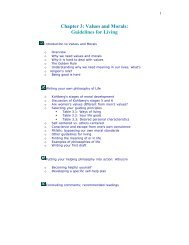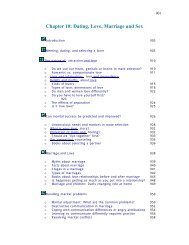Methods for Changing Behaviors - Psychological Self-Help
Methods for Changing Behaviors - Psychological Self-Help
Methods for Changing Behaviors - Psychological Self-Help
Create successful ePaper yourself
Turn your PDF publications into a flip-book with our unique Google optimized e-Paper software.
In order to develop a new behavior, we may have to weaken the<br />
old habit, especially if it is a strong habit. In order to study, we have<br />
to break our habit of watching TV all the time. In order to eat more<br />
healthy food, we have to break our habit of eating lots of red meat.<br />
Sometimes the old habit can be broken instantly, "cold turkey," but<br />
often some technique is needed.<br />
Purposes<br />
Steps<br />
· To disrupt habits that are so automatic that they are done<br />
unconsciously. The disruption draws your attention to the habit<br />
and gives you a chance to stop it. The disruption also enables<br />
you to develop a more desirable habit to replace the unwanted<br />
behavior.<br />
· To provide a pause to think and reconsider in the middle of an<br />
otherwise impulsive, ill-considered response.<br />
· To stop unwanted thoughts, especially depressive ideas, angergenerating<br />
fantasies, and worries.<br />
· To increase your confidence in self-control.<br />
STEP ONE: Plan in advance how to disrupt the unwanted<br />
behavior.<br />
Mostly this consists of making "rules" which you then have to<br />
en<strong>for</strong>ce. For example, it is common to recommend this rule to dieters:<br />
pause between every bite, putting down your <strong>for</strong>k and savoring the<br />
food. This breaks the automatic habit of rapidly shoveling in the food.<br />
It is also recommended that 2 or 3 five-minute "rest periods" be<br />
incorporated into every meal; this gives you practice at stopping<br />
eating and a chance to reconsider if you really want to eat more during<br />
that meal.<br />
Smokers are given rules that disrupt the habit, such as put the<br />
pack in a different pocket, use a different lighter, use a disliked brand,<br />
smoke with the other hand, and so on. Invent your own disruptions.<br />
In the case of impulsive behavior (anger, sarcastic remarks,<br />
seductive actions, etc.), learn to recognize the early signs and plan <strong>for</strong><br />
a pause: "Count to 10," "Stop the insults and think of a compliment,"<br />
or "Stick to business." Important rules <strong>for</strong> restraint are: wait 10<br />
minutes, think about the consequences, and use distraction (think<br />
about something else).<br />
In the case of unnecessary or bothersome thoughts, try "thought<br />
stopping." This is simply yelling (loudly but silently to yourself), "Stop!<br />
Get out of here!" And, believe it or not, the thought often goes away.<br />
It will come back, so yell again. Eventually, by telling yourself that you<br />
don't have to put up with useless or hurtful thoughts, you can<br />
frequently control "your mind" (see method #12 when this makes<br />
things worse or doesn't work).<br />
1105



